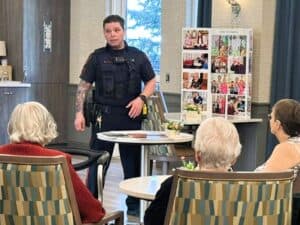
It’s a sad reality that scammers and tricksters have been around since the dawn of time. With the advent and growth of the internet, improvements in technology and with Artificial Intelligence, it’s becoming harder to detect when you might be being targeted. For seniors especially, knowing what is real or what could be a scam can be more difficult.
At All Seniors Care, caring is our number one concern. We want our residents to feel safe and we know that awareness is the key to preventing these crimes. We’ve compiled a list of the top scams that are around right now, how to recognize them and report them.
Common Scams Targeting Seniors in Retirement
Even if you live in seniors housing, these scams exploit trust, financial vulnerability, and sometimes cognitive decline, making seniors susceptible. Here are some of the top scams that continue to target seniors.
1. Grandparent Scams
This is a particularly nasty scam as it emotionally targets seniors, who may not think it’s untoward. The perpetrators will often send a text saying, ‘Hi Grandma, I need your help!’ and the senior will believe it is their grandchild in distress. If you reply, the scammer will engage you, saying they’ve lost their phone, or it’s been taken, and that they need money immediately to get out of a certain situation. If you get a text like this and want to make absolutely sure it’s not genuine, ask for their name and something else only your grandchild would know. Say you will call them and ask for the number.
2. Financial Services Scams
These scams work because they seem to come from a trusted source: your bank, credit card company, mortgage company, or even a debt collection agency. Scammers may call, text, or send emails that look and sound completely legitimate. They might say your chequing or savings account has been compromised and ask for personal information such as your password, banking PIN, or Social Insurance Number to “secure” it. Some will even try to scare you by threatening legal action or arrest for unpaid bills, which may not exist at all.
In Canada, legitimate financial institutions will never ask you to confirm personal details over the phone, by text, or by email. If you’re unsure, hang up or delete the message, then contact your bank or lender directly using the number on your statement or bank card.
3. Online Scams
Fraudsters will use fake emails or websites to trick you into sharing sensitive information or money. They will pretend to be from trusted institutions like banks, or the government and they will want to access your details. These along with Phone Scams can be increasingly hard to identify as the perpetrators make convincing websites or email addresses to mimic the true providers.
4. Phone or Text Scams
Fraudsters often pose as charity representatives, distant relatives, or service providers, and will use high-pressure tactics to try and extract money or information. If something sounds too good to be true, or equally gives you pause for concern, end the call immediately.
Scammers often contact you pretending to be the CRA. Know when to be suspicious. The Canada Revenue Agency will never demand payment by e-transfer, cryptocurrency, or gift cards — or threaten you with arrest, deportation, or prison. If you get a message like this, it’s a scam.
5. Romance Scams
Scammers will build fake relationships online, often with seniors who may be vulnerable and lonely, and they’ll try to emotionally manipulate them into sending money. They will most often use Facebook as their preferred method of connecting, knowing many older adults utilize the platform. If you get a friend request from someone you don’t know, don’t accept it.
6. Tech Support Scams
Fraudsters pretend to be from tech support, convincing seniors to grant remote access to their devices or pay for unnecessary services. They’ll contact you via phone and will create a sense of urgency that they need to gain access to your computer immediately to stop a virus or to investigate an ‘issue’. If someone is asking for remote access to your devices and you have not engaged this person, do not proceed.
7. Identity Theft
Scammers want to steal personal information like your Social Insurance Number (SIN), credit card details, or health card numbers to impersonate you and commit fraud.
8. Sweepstakes and Lottery Scams
Again, you’ll likely be contacted by phone or email, and be told you’ve won a prize but must pay fees or taxes upfront to claim it.
How Scammers Exploit Older Adults
Scammers will use a range of psychological tactics to manipulate seniors, often exploiting trust, fear, and emotions. They can be masters of exploitation and prey on your vulnerabilities. Here are some ways they will do it:
Exploiting Authority: They’ll pose as trusted figures like government officials, bank representatives, or tech support personnel which makes them sound credible.
Creating Urgency: Scammers will try to pressure seniors to act quickly, often overloading them with information or complex details to confuse them and make their scam seem legitimate.
Emotional Manipulation: They play on emotions, such as fear, guilt, or compassion, to make seniors feel obligated to do as they ask. As above with the Grandparent Scam, they’re getting creative about how they may target you.
Building Relationships: Some scammers groom their victims over time, establishing trust before making their move. This happens a lot with Romance Scams and can be particularly hurtful emotionally and financially if you do fall victim.
Offering Fake Incentives: Fraudsters will try to lure seniors with promises of prizes, rewards, or exclusive opportunities that require upfront payments. Again, if it sounds too good to be true it likely is, and if there’s any ask for upfront payments, remove yourself from the conversation.
How To Protect Yourself From Fraud
 Be educated. By reading this article, you’re already educating yourself! Awareness is the first line of defense and being able to recognize how you could be targeted is the best first step.
Be educated. By reading this article, you’re already educating yourself! Awareness is the first line of defense and being able to recognize how you could be targeted is the best first step.
1. Secure Personal Information
Safeguard your sensitive details like your Social Insurance Numbers (SIN), bank account information, and passwords. Avoid sharing these over the phone or online unless absolutely necessary and you know and trust the person you’re giving the info to. If you receive a call from ‘your bank’ ask the person for their agent ID number and say that you will call the bank back. A true representative will have no issue with this. A fraudster will likely hang up.
2. Use Technology Safely
To protect your devices, make sure to install reliable antivirus software, enable two-factor authentication for an added layer of security, and activate fraud alerts to monitor your accounts. Avoid connecting to unknown or non-password protected Wi-Fi networks. Free Wi-Fi is great, but unsecured wireless networks can compromise your information!
3. Protect Your Passwords
Remember the days when we could recall every important phone number by heart? These days, most of us can’t even remember our own passwords — and that’s okay, as long as we store them safely. Change your passwords regularly to minimize risks, and never use the same passwords or PINs for multiple accounts, especially banking. Use a password manager to securely create and keep unique passwords for each account, and avoid saving them in your email, notes app, or on scraps of paper.
4. Monitor Financial Activity
Look over your bank statements and credit reports regularly for any unusual transactions. Consider setting up account alerts for large withdrawals or transfers and speak to your bank about how they also try to mitigate fraud and what services they have to help you.
5. Limit Unsolicited Contact
You can add your phone number(s) on the national Do Not Call list which will stop telemarketers from connecting with you. If you receive any calls from ‘Caller ID Unknown’ or any number you don’t recognize, don’t answer. If it is someone legitimate, they will leave a message.
6. Build a Support Network
Openly communicate with family and friends as scammers often target isolated individuals, so staying connected with others can reduce vulnerability.
Report Suspicious Activity
If you do make a mistake – don’t be ashamed!
People often don’t report fraud because they’re embarrassed that it happened to them. Or, they may have only lost a small amount of money and don’t want to go through the hassle of reporting it.
It’s estimated that only five percent of fraud gets reported to authorities. This means that law enforcement agencies have a harder time staying ahead of the game, obtaining the necessary evidence to catch perpetrators, and warning the public about potential fraud.
Fraudulent or suspicious activity should be reported to the Canadian Anti-Fraud Centre, through its website at www.antifraudcentre.ca, or by telephone at 1-888-495-8501. Compile as much information and evidence as you can.
How ASC Retirement Communities Help Protect Seniors From Fraud and Identity Theft
 Even in the safety and comfort of a retirement community, seniors can still be targeted by fraud. Scammers know that older adults are often trusting, may be less familiar with evolving technology, and can have predictable routines. At All Seniors Care, protecting residents is a priority — from offering programs like Tech Savvy Seniors, to hosting seminars with local law enforcement on the latest scams. Our teams are always ready to listen, offer guidance, and help residents take the right steps if something doesn’t feel right.
Even in the safety and comfort of a retirement community, seniors can still be targeted by fraud. Scammers know that older adults are often trusting, may be less familiar with evolving technology, and can have predictable routines. At All Seniors Care, protecting residents is a priority — from offering programs like Tech Savvy Seniors, to hosting seminars with local law enforcement on the latest scams. Our teams are always ready to listen, offer guidance, and help residents take the right steps if something doesn’t feel right.
If you live with us at All Seniors Care, talking to someone can include your Executive Director or Director of Care, or any team member you feel comfortable sharing with.
If you don’t live at All Seniors Care, you can learn more about us and our safe, supportive communities. If you’re interested in joining us, take a look at the wonderful seniors’ residence in your city; we’d love to welcome you home.
Caroline Inman is a seniors housing expert based in Ontario and our Director of Residence Relations for Ottawa. A former journalist, she’s passionate about educating and sharing information with seniors and their families, to help them make informed decisions.
